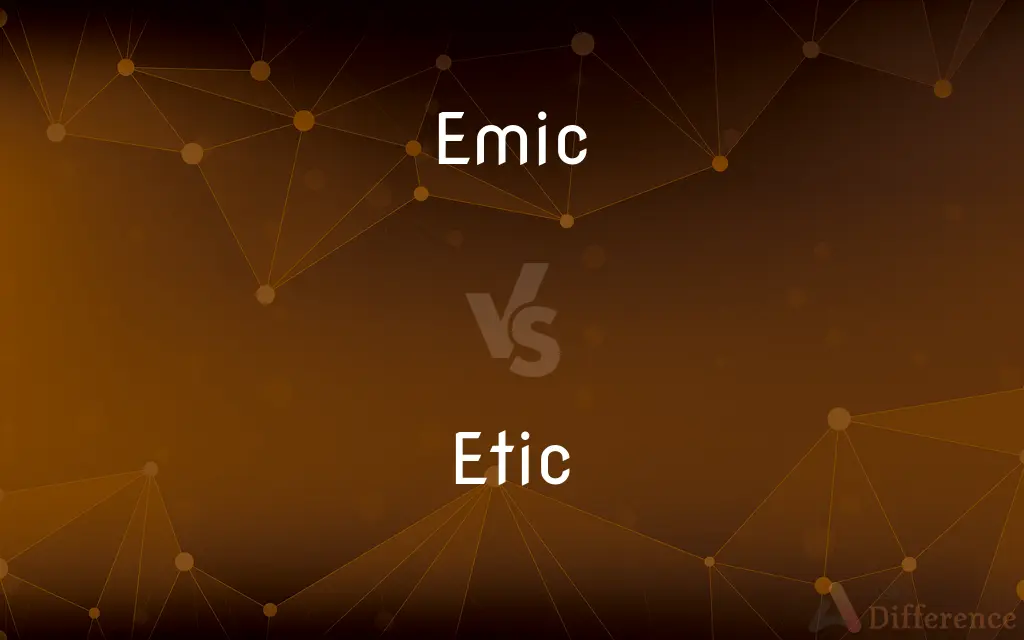Emic vs. Etic — What's the Difference?
Edited by Tayyaba Rehman — By Fiza Rafique — Updated on October 1, 2023
Emic refers to an insider's perspective, focusing on intrinsic cultural distinctions. Etic is an outsider's view, emphasizing universal comparisons across cultures.

Difference Between Emic and Etic
Table of Contents
ADVERTISEMENT
Key Differences
Emic approaches to understanding culture emphasize the unique distinctions and meanings as understood by members of the culture itself. In contrast, the Etic perspective looks at cultures from an outsider's viewpoint, focusing on general categories and comparisons that are universal across cultures.
When anthropologists or researchers use an Emic perspective, they're seeking to understand the culture on its terms, valuing the native explanations and interpretations. The Etic approach, meanwhile, tends to categorize cultural phenomena based on external criteria, which can be applied to other cultures.
For instance, using an Emic approach, one might seek to understand a local ritual from the participants' viewpoints, capturing their beliefs, feelings, and narratives about the ritual. An Etic approach to the same ritual might analyze it in terms of universally understood concepts like social cohesion or symbolic representation, which might be applied across multiple cultures.
Both Emic and Etic viewpoints have their merits in anthropological and sociological research. The Emic perspective provides depth, allowing a deep dive into cultural nuances, while the Etic perspective offers breadth, facilitating cross-cultural comparisons.
Comparison Chart
Perspective
Insider's view of a culture.
Outsider's view comparing multiple cultures.
ADVERTISEMENT
Focus
Intrinsic cultural distinctions.
Universal categories and concepts.
Application
Understanding culture on its terms.
Categorizing cultural phenomena based on external criteria.
Example
Interpretation of a local ritual by participants.
Analysis of rituals across cultures for social cohesion.
Benefit
Provides depth into cultural nuances.
Allows for broader cross-cultural comparisons.
Compare with Definitions
Emic
Concerned with the interpretation of cultural phenomena based on its inherent values.
She took an Emic approach to understand the local language nuances.
Etic
Relating to the analysis of cultures from an outsider's perspective.
Her Etic observations highlighted common patterns among different tribes.
Emic
Relating to the intrinsic culture from an insider's viewpoint.
His Emic research provided deep insights into the tribe's beliefs.
Etic
Concerned with making cross-cultural comparisons.
An Etic approach revealed similarities in rituals across continents.
Emic
Focused on understanding and describing culture in its unique context.
The Emic study highlighted the specific dietary habits of the community.
Etic
Focused on categorizing cultural phenomena based on universally understood concepts.
Etic research compared the economic structures of various societies.
Emic
Valuing the native explanations and interpretations.
Through an Emic lens, the festival's significance was deeply cultural.
Etic
Emphasizing objective and generalizable observations.
The Etic findings showcased general trends in urban migration.
Emic
Capturing the beliefs, feelings, and narratives from within a culture.
The Emic documentation portrayed the community's shared stories.
Etic
Capturing broad patterns applicable across multiple cultures.
Using an Etic lens, the study explored global marriage customs.
Emic
Relating to or denoting an approach to the study or description of a particular language or culture in terms of its internal elements and their functioning rather than in terms of any existing external scheme
Accurate ethnographic description from an internal or emic perspective, from the native point of view
Etic
Relating to or denoting an approach to the study or description of a particular language or culture that is general, non-structural, and objective in its perspective
Is there a valid cross-cultural etic definition of violence?
Emic
Of or relating to phenomena considered as meaningful structural units within a system such as a language or culture.
Etic
Of or relating to features or items analyzed without considering their role as a structural unit in a system such as a language or a culture.
Emic
Of or pertaining to the analysis of a cultural system or its features from the perspective of a participant in that culture.
Etic
Of or pertaining to analysis of a culture from a perspective situated outside all cultures.
Common Curiosities
Can a researcher combine both Emic and Etic approaches?
Yes, combining both can provide a comprehensive understanding of cultural phenomena.
How does Etic view cultures?
Etic takes an outsider's viewpoint, emphasizing universal comparisons across cultures.
When might one use an Etic approach?
Etic is useful for cross-cultural comparisons and studying broad patterns.
Does Etic always involve comparing multiple cultures?
Often, but not always. Etic can also analyze one culture using external, universal criteria.
What does Emic focus on in research?
Emic focuses on an insider's perspective, valuing the unique cultural distinctions.
How does Etic contribute to anthropology?
Etic allows for objective, broad comparisons, identifying commonalities among cultures.
Are Emic studies qualitative in nature?
Often, but not strictly. Emic can be qualitative, quantitative, or mixed, based on the research aim.
Can Emic research be biased?
While Emic is in-depth, it can be subjective, reflecting insider views and interpretations.
Is Emic always culture-specific?
Generally, yes. Emic delves into the unique aspects of a specific culture.
Can Etic research be considered objective?
While Etic aims for objectivity, it can still be influenced by the researcher's own cultural biases.
Why is the Emic perspective important?
Emic provides depth, capturing cultural nuances and native explanations.
What's a key benefit of the Emic approach?
Emic captures the authentic experiences and meanings of cultural members.
Why might a researcher choose an Etic approach over Emic?
To identify patterns or make comparisons that are generalizable across cultures.
What's an example of an Emic study?
Studying the meaning of a local festival through the eyes of the community members.
How can Etic findings benefit global studies?
Etic can highlight universal behaviors, trends, or patterns observed in multiple cultures.
Share Your Discovery

Previous Comparison
Love vs. Sweetheart
Next Comparison
Acidulous vs. AcidAuthor Spotlight
Written by
Fiza RafiqueFiza Rafique is a skilled content writer at AskDifference.com, where she meticulously refines and enhances written pieces. Drawing from her vast editorial expertise, Fiza ensures clarity, accuracy, and precision in every article. Passionate about language, she continually seeks to elevate the quality of content for readers worldwide.
Edited by
Tayyaba RehmanTayyaba Rehman is a distinguished writer, currently serving as a primary contributor to askdifference.com. As a researcher in semantics and etymology, Tayyaba's passion for the complexity of languages and their distinctions has found a perfect home on the platform. Tayyaba delves into the intricacies of language, distinguishing between commonly confused words and phrases, thereby providing clarity for readers worldwide.















































